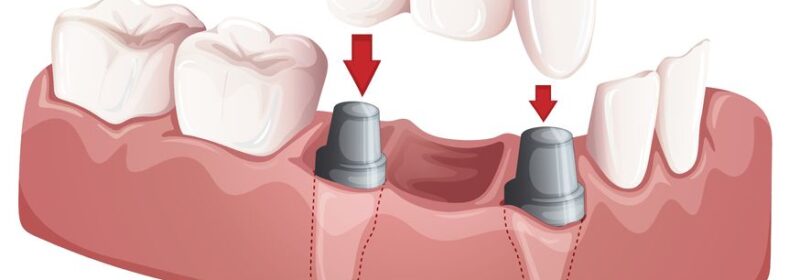
|

|

|

|

Can Dental Implants Fall Off and What to Do If That Happens
Dental implants are artificial tooth roots, or prosthetics, made of metal and allowed to get embedded in the jawbone. These metal screws are implanted so that missing or lost teeth can be replaced using an abutment on top of the implant and also to help regrow lost jawbone because of resorption.
How does dental implant work?
Dental implant is actually a screw made of metal Titanium which is inserted into the jawbone. Using the body’s mechanism of growing tissues where needed, the implant starts to be surrounded by bone tissue and in a few months is completely surrounded by them. Once it is totally entrenched and bonded with the bone tissues around it, the implant gets rooted in the bone just like natural tooth root. After full bonding the abutment will be attached on top of the implant which will support the replaced tooth crown – replica of the missing tooth- that will be fixed on top of the abutment with a tiny screw.
Can implants fall off?
It is typically not possible for implants to fall off. The crowns are fixed on implants only after they have been fully bonded with the bone tissues in the jawbone. There are very rare cases of actual dental implant falling off, because it is entrenched in the bone. What happens sometimes is the crown or the abutment on which the crown is fixed falling off. In such a case, when you think your dental implant has fallen off, call your dentist first thing. After hearing you out and asking few key questions, your dentist will decide what has really fallen off. In most cases, what falls off is the abutment screw or the replaced tooth, not the actual implanted metal screw.
What are the reasons that make the implants and crowns or abutments fall off?
- Resorption or bone loss: Lack of Osseointegration is the main cause of implant getting loosened, in turn making the crown loose and fall off. Osseointegration is the growth of bone tissue around the metal implant. When for whatever reason the body resorb the bone, there is not enough tissues around the implant to support it and keep it fixed in the bone.
- Gum disease: Peri implantitis is a kind of gum disease which is associated with the infections due to dentures. The gum disease which has not been taken care of before the implants were fixed also can become one of the reasons for implants to come loose and make the crowns fall off.
- Loose crown: when the tooth shaped cap that replaces the missing tooth does not fit well and is loose, it can fall off. A loose crown is also a liability for the implant because it exerts pressure on the implant and if it does not fit well, it may make the implant unstable.
- Bruxism: people who have a habit of grinding teeth, the pressure on the implants slowly builds up and causes them to loosen up.
- Medical conditions: people who have diabetes, kidney problems or other diseases like cancer, may have problems with bonding of the implant with bone tissues due to the effect on the metabolism. Radiation or chemo therapy also affects bonding.
- More teeth replacements on fewer implants also puts a lot of load on the implants and make them wobbly due to lesser bone mass to support them for such pressure than what they can bear.
There are some early signs of the implant coming loose. If you find the chewing painful, or if you have chronic pain in and around the implant constantly, it is a sign is amiss. Loss of bone mass around the implant also is a sign that the implant is losing bone support and may come loose. Bleeding around the implant while chewing or otherwise is also a sign that the implant is losing the bone support and is going to come lose.
Usually implants if successful will last for years, or may be lifetime. But What should be done in case you find yourself in an unlikely situation of losing a crown or an implant.
What to do when your dental implant/dental crown falls off?
First, do not panic. Try to ascertain whether the it was dental implant that fell off or a part of the crown, the abutment or a screw that fixed the crown on top of abutment. Find the part that has fallen off and call your dentist immediately. Do not eat anything until you have spoken to your dentist. Rinse your mouth with water and wait for the dentist’s instructions. Follow whatever your dentist asks you to do till you visit him.
Once you see your dentist, he will check out the place of the implant and the fallen piece of implant. Depending on what he finds, he will try to decide on the reason why the implant fell out. Whatever may be the reason, the area surrounding the implant has to heal before any work can be done on it. If the bone fell off because of the lack of bone support, the dentist will allow the bone to grow again around the implant. In some cases, if feasible, the dentist may use the bone grafting for extra bone growth motivation, in the surrounding area of the implant for the sufficient bone mass to secure the implant properly in place.
Fallen out implant is very unsafe, and getting it replanted should be your top priority. The dentist will find out if there is any infection in the gums, and if so, he will treat the gum disease before replanting the implant. It is serious condition to have infection in the gums while the implant is not in place, because the infection can spread in the mouth and jaw, further complicating the issue.
Usually the fallen abutment is discarded, and a new one is fixed in its place, if it is the abutment that has come loose. The screw sometimes come loose because it is resisted by the gums tissue and bone.






